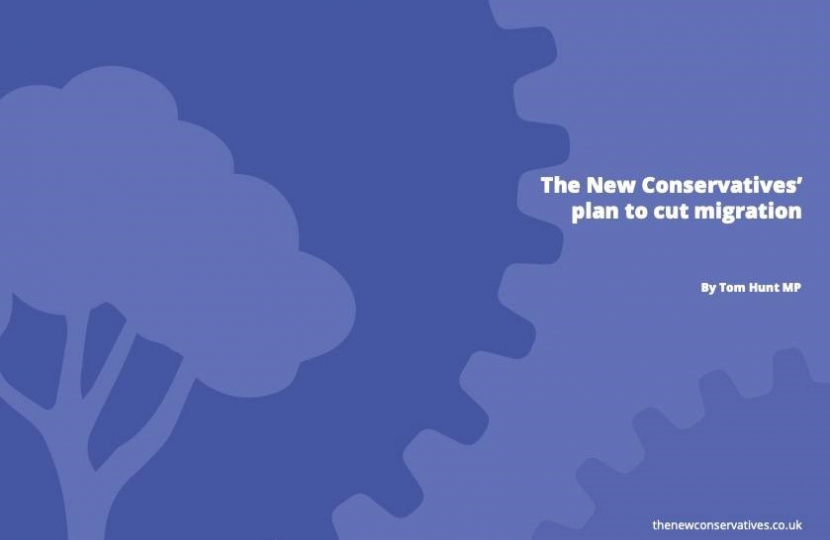
Cutting net migration by Tom Hunt MP.
I published an extensive report supported by over 20 fellow Conservative MPs calling for substantial cuts to net migration. The report outlines 12 recommendations as to how this can be done.
Throughout our history, our country and Town has benefited from immigration when it's at sustainable levels. Sadly, in my view, and I believe the view of the majority of the public, these levels of migration have become unsustainable. I think you'd struggle to muster together more than 15-20 % of the electorate who would support net migration being at its present levels (over 500,000 per year). Just to put this into perspective, this is roughly four large Towns the size of Ipswich being added to the country every year. Is it a surprise we have a housing crisis? Is it a surprise our roads have never been more congested? Clearly many of the pressures around public services are also linked to this issue.
The British people shouldn't be shut out of this debate. Right now, there is a chasm between where the majority of the public are on this issue and the reality of the current numbers. This needs to be addressed urgently. Clearly illegal migration is currently a huge issue and one I comment on frequently. The Prime Minister is outlining robust steps to make progress on this issue through the illegal migration bill and the Rwanda plan but it’s wrong to think that it's only illegal migration which is of significant public concern. The level of net legal migration is also one. Due to EU freedom of movement being ended this is now a debate we can have. We can now control legal migration fully. However, I think it’s fair to see that the new points-based immigration system needs a few tweaks!
When we debate net migration and the level we want it to be at, we need to view the issue in the round. It can't just be viewed through the prism of GDP figures. It also needs to be viewed through the prism of GDP per capita, the impact on housing, the impact of public services, the impact of social and cultural cohesion and the environment. Ultimately it needs to be about what the impact is for the quality of life of British citizens. This is precisely why I've recommended the role of the Migration Advisory Committee is expanded to not purely look at the issue through economic lenses.
Have a read of the 12 recommendations I outline. They include increasing the salary threshold for getting a work visa, increasing English language requirements for family visas, putting strict limits on how many non-UK nationals can get access to social housing and building on recent actions by the Government to stop the international student’s route being used by some as a backdoor into the country.
There has been some criticism of the report in some quarters. For example, on care workers. We recommended ending the temporary care worker’s visa. This would only be done gradually. I do however think we need to raise the status and wages of those working in the care sector. It's unhealthy for any one sector to be dominated by foreign workers. There needs to be more of a focus when it comes to training people up locally to take on these hugely important roles. We shouldn't be addicted to cheap labour from abroad for any of these roles and I feel like we currently are to an extent.
Some have also raised concerns about what these proposals mean for the University sector. Ultimately though, when it comes to the Government of the day shaping our immigration policy, the key consideration should be what's the overall impact on the quality of life of the people living here. It isn't the job of Government to distort our immigration policy to prop up the finances of many Universities, who have often failed to provide our country with the pipeline of skills we need. High quality students studying high quality courses should continue to be allowed to study here but there shouldn't be an expectation they can bring their whole family with them and hang about for 2/3 years after they've finished their course even if they have no job to go to.
I have absolutely no doubt this report will attract shrill criticisms from the left. I will of course be branded as a xenophobe and wilfully misrepresented by sections of the local Labour Party. Do I care? No. I know from the vast majority of conversations I have with constituents that there will be a lot of support out there for these 12 proposals.
Absolutely no one is suggesting that throughout our history our country hasn't benefitted from immigration in all sorts of ways. No one is suggesting that our Town hasn't been enriched by the contribution of thousands of people who have come here and made Ipswich there home. What we are saying however, is that present levels of net migration are too high and have become unsustainable in all sorts of different ways. This report is a plan for how we can change that.
Our 12 Recommendations are:
RECOMMENDATION 1
Close the temporary schemes that grant eligibility for worker visas to ‘care workers’ and ‘senior care workers’. This policy will reduce visas granted by 117,000 between those workers and their dependants, leading to a reduction in Long Term International Migration (LTIM) of 82,000.
RECOMMENDATION 2
Raise the main skilled work visa salary threshold to £38,000 per annum. This could reduce LTIM by 54,000 migrants per year.
RECOMMENDATION 3
Extend the closure of the student dependent route, which allows full access to the job market and is not subject to skill or salary thresholds, to students enrolled on one-year research Master’s degrees. Combined with the Government’s existing proposal, this could lead to a reduction of more than 150,000 visa entry clearance grants per year, reducing LTIM by around 75,000.
RECOMMENDATION 4
Close the Graduate Route to students, so as to stop students staying in the UK after graduating for up to two years without a job offer. This should lead to a reduction of around 50,000 in LTIM per year.
RECOMMENDATION 5
Reserve university Study Visas for the brightest international students by excluding the poorest performing universities from eligibility criteria. This could lead to a reduction of around 75,000 visas granted, leading to a reduction of 49,000 from LTIM.
RECOMMENDATION 6
Continue to monitor the reduction in visa applications under the Humanitarian schemes and introduce caps on future humanitarian schemes should the predicted 168,000 reductions not be realised.
RECOMMENDATION 7
Rapidly implement the provisions of the Illegal Migration Bill, leading to a reduction of at least 35,000 from LTIM.
RECOMMENDATION 8
Cap the number of refugees legally accepted for resettlement in the UK at 20,000, allowing provision for this to be lifted to respond to an unforeseen emergency, such as a natural disaster or war.
RECOMMENDATION 9
Raise the minimum combined income threshold to £26,200 for sponsoring a spouse and raise the minimum language requirement to B1 (intermediate level). Such an income threshold is sensitive to the importance of family ties as it is still exceptionally low. It brings it in line with the current income threshold for main work visas that are based only on one income, rather than a combined income for two people. This should lead to an estimated 20,000 reduction in LTIM.
RECOMMENDATION 10
Make the Migration Advisory Committee report on the effect of migration on housing and public services, not just the jobs market, by treating future demand on a par with labour requirements in all studies.
RECOMMENDATION 11
Cap the amount of social housing that Councils can give to non-UK nationals at five percent until the number of British families waiting for housing clears.
RECOMMENDATION 12
Raise the Immigration Health Surcharge to £2,700 per person, per year.

